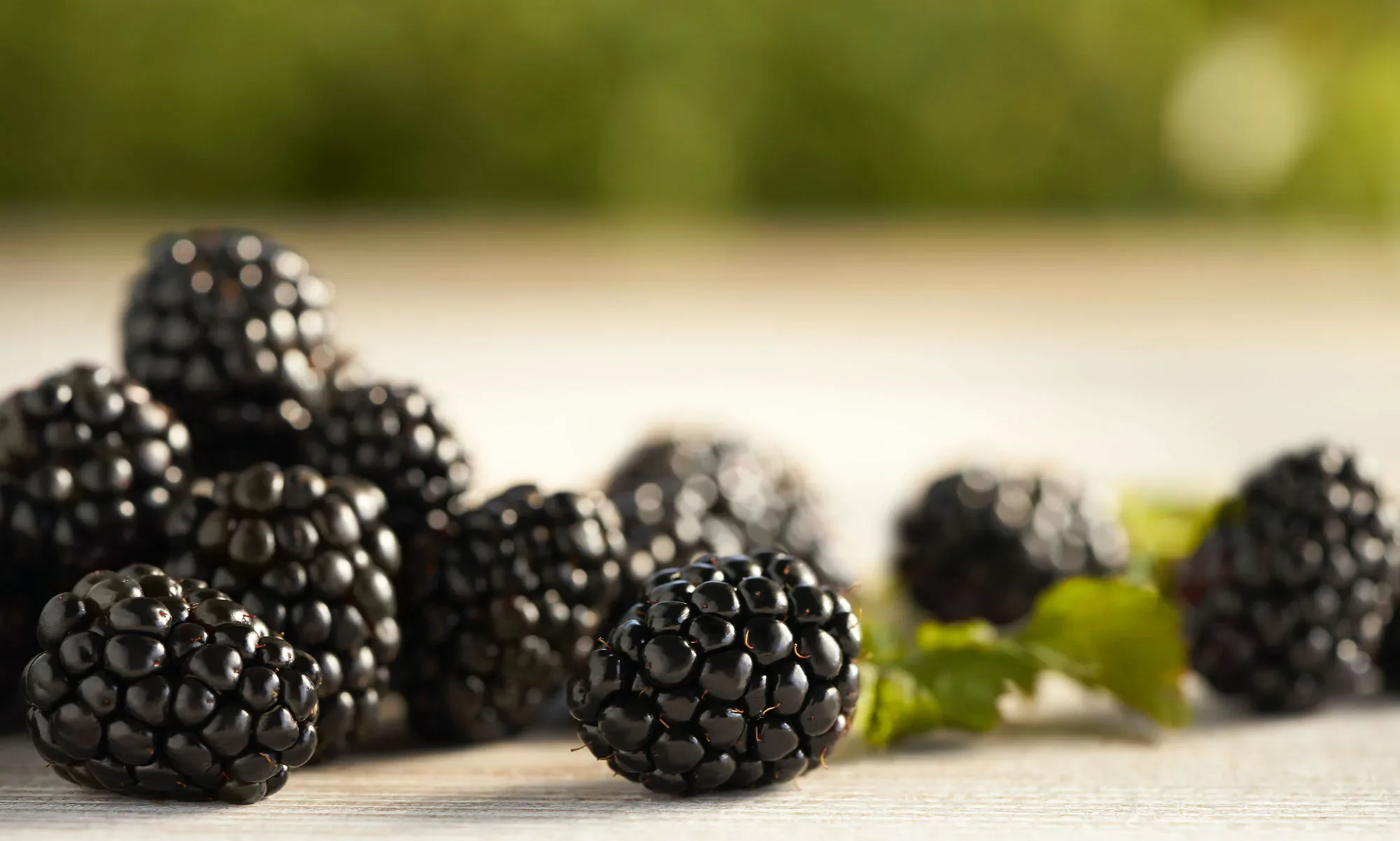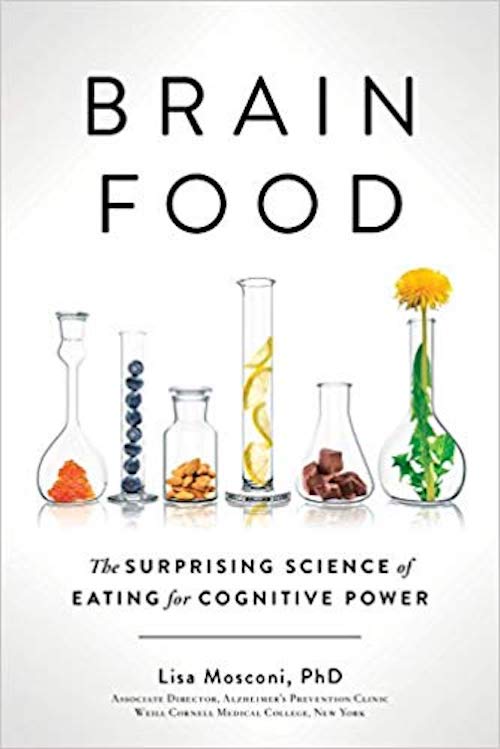I recently read Brain Food, the Surprising Science of Eating for Cognitive Power, by Lisa Mosconi, PhD. Here are my notes. If you want to know the ‘why’ for any of these items, I highly recommend reading the book. In it, Dr. Mosconi lays out the scientific basis for each of these items.
Excerpt: “A new diet known as the MIND diet (Mediterranean-DASH Intervention for Neurodegenerative Delay diet) makes the Mediterranean diet easier to follow no matter where one lives in the world. Its core principles are: three servings of whole grains plus a salad and one additional vegetable every single day, along with a glass of [red] wine. Legumes are eaten every other day, while poultry and berries are included twice a week. Fish is consumed once a week. Additionally, to have a real advantage against the devastating effects of Alzheimer’s, dieters are encouraged to limit foods considered unhealthy, especially fried or fast foods but also high-fat dairy and meat. If that sounds too demanding, here’s some incentive: the MIND diet lowered the risk of Alzheimer’s by as much as 53 percent in participants who adhered to the diet rigorously.”
GENERAL NOTES
Follow a Mediterranean Lifestyle
—A Mediterranean lifestyle is a synergy of exercise, water, nutritious foods, brain stimulation, socialization, stress relief, sleep
—What’s good for the heart is good for the brain
—Buy and eat quality over quantity
—High-quality fish and shellfish: good for brains, reduces risk of memory loss and dementia
—Foods high in essential omega-3 fats (esp. DHA) = brain food
—Brain-essential antioxidant vitamins, minerals, good carbs, good fats, lean protein
—Less fat, animal protein, salt, sugar
GET REGULAR EXERCISE
Being sedentary makes the brain age faster
—It doesn’t need to be rigorous. 30 minutes every day of moderate-intensity activities (brisk walking, bicycling, gentle swimming, housework, gardening, taking the stairs). The goal is consistency and frequency…and to keep moving.
—My routine
* Move More: 250 steps each hour to break up periods of sitting
* Aerobics: 20 minutes/day (brisk walking /or/ elliptical glider)
GOAL: 45 minutes/day
* Strength Training: 2 x week (RBG Workout—weights, bands, planks, push-ups)
* Flexibility Activity: 2 x week (yoga, tai chi)
STAY HYDRATED
Dehydration accelerates brain shrinkage
—Eight 8-ounce cups of water per day (filtered or spring)
—Alternatives: herb teas, fruit-infused water, lemon-infused water
—Clean drinking water: Install a water filter that leaves minerals in
—Morning Tonic: 1 shot Tahitian noni juice, followed by a glass of water with 1 fluid ounce aloe vera juice and a teaspoon of liquid chlorophyll (start with 1/4 tsp.)
EAT THESE FOODS
The brain needs specific nutrients to thrive
TWICE A DAY
—Vegetables (1 cup or more, twice a day)
Eat with both lunch and dinner. Leafy greens or cruciferous vegetables (organic, non-GMO) Spinach, kale, chard, dandelion greens, watercress, mustard greens, arugula, collard greens, bok choy, chicory, radicchio, colorful lettuces + broccoli, cauliflower, Brussels sprouts, cabbage
Additionally: Add fresh asparagus, green beans, carrots, onions, tomatoes, bell peppers, winter squash, eggplant, shiitake mushrooms, zucchini, beets, fennel (organic, non-GMO)
—Berries (1/2 cup, twice a day)
Raspberries, blackberries, red currants, boysenberries, gooseberries, goji berries, mulberries, black cherries
—Whole Grains (1 cup—or 1 slice organic whole grain bread—twice a day)
Steel-cut oats, organic brown rice, amaranth, millet, spelt, kamut, buckwheat, quinoa, wild rice, as well as products made from these grains, such as Ezekiel bread. Sprouted products preferred.
—Legumes (1 cup, twice a day)
Chickpeas, lentils, split peas, adzuki, black, cannellini beans
ONCE A DAY
—Yogurt (1 cup, once a day)
Organic, full-fat, plain, unsweetened, with active probiotics
—Other Fruits—(1 cup, once a day)
CITRUS (oranges, grapefruit, lemons, tangerines, mandarin oranges). APPLES (Gala, Red Delicious). OTHER TREE FRUITS (1/2 cup) Plums, peaches, pears
—Oils: (2 tablespoons, once a day)
Unrefined extra virgin olive oil, cold-pressed & unrefined flaxseed, coconut, and avocado oils (avocado oil is best for cooking, has a high smoke point). Whole avocados (1/4), olives (4-5)
—Chocolate: (1 oz., once a day)
High quality very dark chocolate (75%, or more, cacao)
—Coffee: (2 cups, once a day) (or 1 demitasse of espresso)
—Green Tea: (2 cups, once a day)
—Red Wine: (Women: One 5-ounce glass, once a day) (Men: Two 5-ounce glasses, once a day) Avoid if you can’t be moderate. Alternative: pomegranate juice
—Green Juices & Smoothies (once a day as a snack if the calories are ok)
Add leafy greens, vegetables, nuts, seeds, fruit, water
—Antioxidant Additions to Meals
Brazil nuts, cacao, goji berries, almonds, chia, flaxseeds. Add to smoothies, soups, salads, stews
EVERY OTHER DAY
—Nuts & Seeds (2 tablespoons, every other day)
Raw, unsalted. NUTS: almonds, walnuts, Brazil nuts, pistachios SEEDS chia, flax, sunflower, hemp, sesame, pumpkin (toast them yourself). Add to smoothies, soups, salads, stews
2—3 TIMES A WEEK
—Fish & Shellfish (3+ ounces, 2—3 x week)
Fresh or frozen wild-caught salmon (Alaska, sockeye), halibut, sea bass, mackerel, cod, trout, Bluefin tuna, yellowtail tuna, canned tuna in water, canned wild Alaskan salmon, shellfish (esp. oysters and shrimp), anchovies, salmon roe & black caviar (2-3 teaspoons)
—Okinawan Sweet Potato (half a sweet potato, 2—3 x week)
Organic, non-GMO
—Nut Butters: (2 tablespoons, 2—3 x week)
Organic almond or hazelnut butter
—Mushrooms: (10 ounces, 2—3 x week)
Anti-inflammatory, Vitamin D, selenium, neuron-protecting spermidine
1—2 TIMES A WEEK
—Eggs: (1-2 eggs, once or twice a week)
Steamed or poached (from free-range, organically-fed chicken)
1 TIME A WEEK
—Tofu: (golf ball size, once a week)
Organic, non-GMO
—Poultry: skinless (3 oz., once a week)
Free-range, organic feed chicken, duck, turkey, Cornish hens, pheasant, quail
—Cheese: (1-2 oz., once a week)
Naturally low fat sheep and goat cheeses (which are also naturally grass-fed): chèvre, Pecorino, feta. Also Romano, Parmesan, aged cheddar, ricotta, Dry Jack
AS NEEDED
—Milk: (grass-fed, organic)
Use sparingly for coffee, tea, whole grain morning cereals. Alternatives: unsweetened organic nut milks.
—Sweeteners
Use sparingly—local raw honey, organic maple syrup, coconut sugar, organic brown rice syrup, yacon syrup, blackstrap molasses, fruit purees, fruit butters, dried fruits like medjool dates. If eating low carb, use stevia.
SUPPLEMENTS
Help for specific issues
—Omega-3 DHA: 300-500 mg/day, for those over 60 and those who don’t eat fish
—Choline: 300-600 alpha-GPC mg/day /or/ 420 mg/day (aka, phosphatidylcholineon) for days you don’t eat fish
—B Complex: (make sure it has 50 mcg of B12) for people 50 or older, especially for people with gastritis, Crohn’s, celiac, diabetes
—Probiotics: Best: 1 cup probiotic yogurt, daily. Alternative: probiotic supplement with live cultures. Improves brain function.
—Coenzyme Q10:100-200 mg/day, esp. if 60 or older. To replenish reserves from previously bad diet. Powerful antioxidant.
—Ginkgo biloba extract: 240 mg/day if fairly sedentary. Cognitive function.
—Red panax ginseng: 4 grams/day. Cognitive function.
—If taking a multivitamin, try to take one without copper, iron, zinc. Make sure nothing is over 50% RDA.
AVOID / ELIMINATE THESE FOODS
These foods increase the rate of cognitive decline
AVOID
—Salt: Except when cooking, then use unrefined sea salt and/or pink Himalayan salt. Alternatives: tamari, coconut aminos, nutritional yeast, miso paste, Bragg liquid aminos, herbs and spices)
—Beef & Pork: No more than 1x month, always pasture-raised, grass-fed, antibiotic-free—roasted, grilled, or sautéed
—Poultry Skin: It’s saturated fat
—Soy Products: Unless they’re non-GMO and organic
—Spirits: Keep consumption to no more than 2-3 times a month. Quantities: beer (12 oz.), distilled liquors (1 ounce). It would be best for your brain to not drink these at all.
ELIMINATE
—Sugar: Also sodas, energy drinks, candy, fruit juices. Alternatives: See “Sweeteners,” above.
—Dangerous Fats
Trans fats: *Always Check Labels* Trans fats are frequently found in crackers, bakery products (cookies, cakes, muffins, pastries, doughnuts, frozen pies), chips, frozen pizza, fired fast food, margarine & vegetable shortening, some microwave popcorn, non-dairy coffee creamer, refrigerated biscuits, cinnamon rolls, ready-to-use frosting
Partially-Hydrogenated Oils & Shortening: Found in fried foods, French fries, mozzarella sticks, battered food, chips, candy, cookies
Saturated fats: Found in n meats, poultry skin, eggs, cheese, butter, sausage, bacon
Refined Oils High In Omega-6: Grapeseed, sunflower, corn, soybean, sesame, and peanut oils.
FOODS UNHEALTHY FOR YOUR BRAIN
Processed Meats: Sausages, hot dogs, salami, ham, bacon, salted/cured meats, corned beef, smoked meats, dried meat/jerky, canned meats
Fast Foods
Refined Grains: Anything made with flour, or that is otherwise processed, is ‘refined’—i.e., white rice, white bread, corn bread, breakfast cereals, commercial baked goods, etc.
Condiments: Unless homemade without sugar
Unhealthy Additives: Lecithin, polysorbates, polyglycerols, carboxymethylcellulose, carrageenans, xanthan gum, guar gum, propylene, sodium citrate, and mono- and di-glycerides
LOSE WEIGHT, IF NEEDED
Cardiovascular disease is a major risk factor for dementia
Heart disease is not only modifiable, but also largely preventable
—Use a Body Mass Calculator to see if you need to lose weight—HERE
—Eat less calories than you expend
—Exercise daily (3,000-7,500 steps, or 30-40 minutes of swimming, dancing, etc.)
—Eat a good breakfast, good-sized lunch, and a small, early dinner
—Eat a Mediterranean diet with low/no grains, legumes and animal fats. Reintroduce after weight loss.
—Intermittent fasting: Make sure there’s 10-12 hours between dinner and breakfast. Next level: eat normally 5 days a week. For the remaining 2 days, eat no more than 600 calories per day.
—Avoid alcohol until weight loss has begun, limit to 1 glass red wine only, remember that wine’s calories count.
GET INTELLECTUAL STIMULATION
“Use it or lose it”
—Activities: Writing, reading, practicing music, painting, knitting, gardening, research
—Learn: A language, musical instrument, software, sport, dance, tai chi, take an online course
—Games: Crossword puzzles, board games, chess, cards, word games like Scrabble
—Break Routines: Driving routes, doing chores with non-dominant hand, new musical genres, where one sits, eats, walks
CONNECT WITH OTHERS
A loving brain results in a happier and longer life
—Connect with: Friends, family, acquaintances
—Make love, give and receive massage
—Volunteer: At a charity, museum, school/day care, prison, homeless shelter, park, library
—Teach: Music, art, writing, sports, yoga, cooking, sewing, dancing, hiking, gardening, any skill that you can share
—Join Clubs & Groups: Writers & book lovers, musicians & music lovers, artists, collectors, hikers & walkers, gardeners, swimmers, travelers, exercisers, sportspeople
—Take Classes: Art, writing, gardening, rowing, cooking, yoga, tai chi, Pilates, swimming, audit college classes, go back to school
REDUCE STRESS
It is very important to take whatever steps necessary to reduce stress
and enjoy your journey on the planet
—Yoga, meditation, tai chi, gardening, nature walks, massage, slow swimming, listening to calming music
GET ENOUGH SLEEP
Sleep cleans the brain of toxins
—GOAL: 7-8 hours
—Nap if needed, between 1-4:00 in the afternoon is best
—There are relaxing teas that can help

